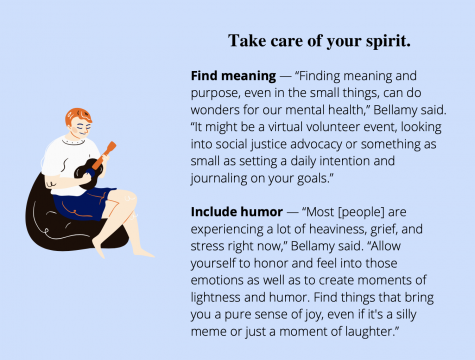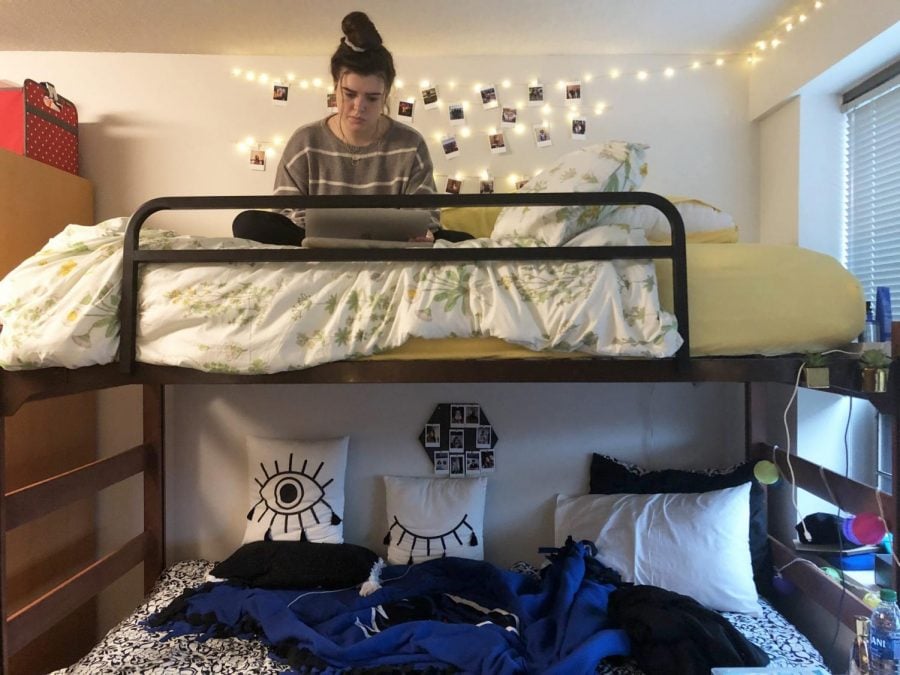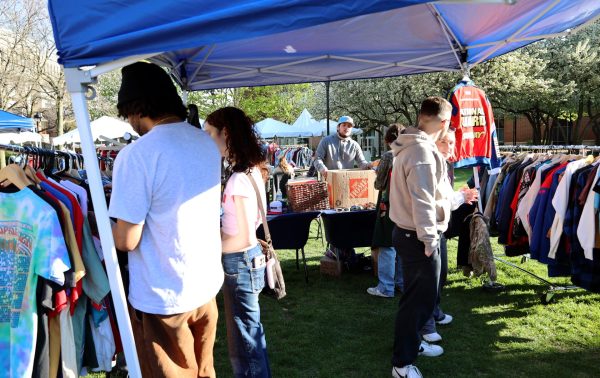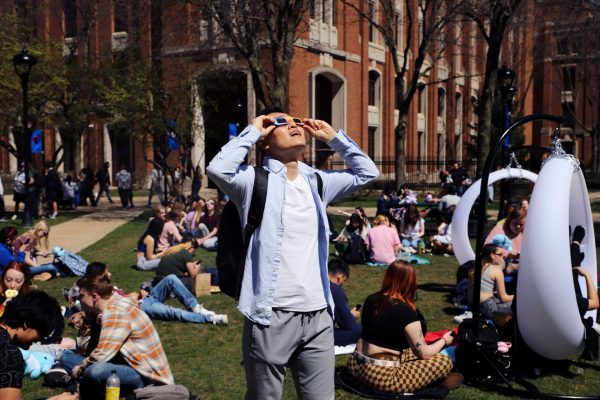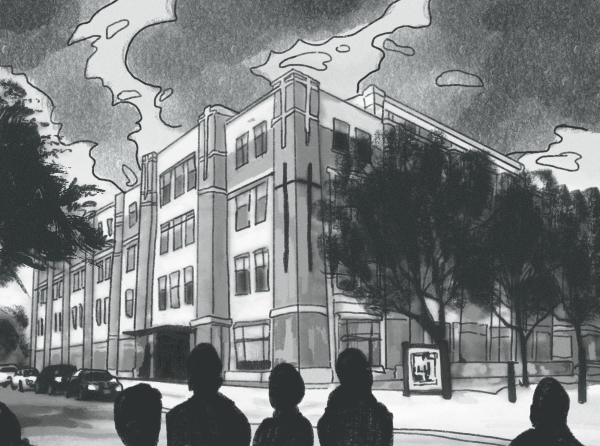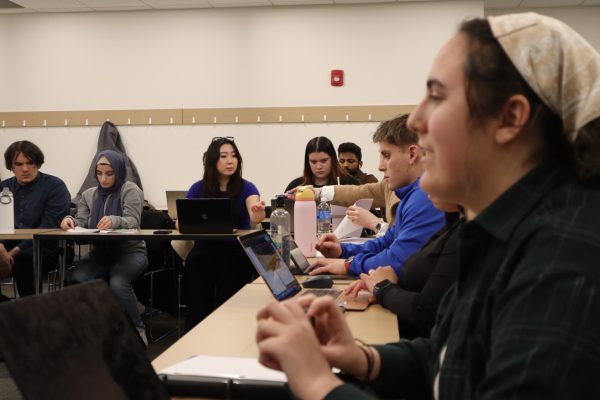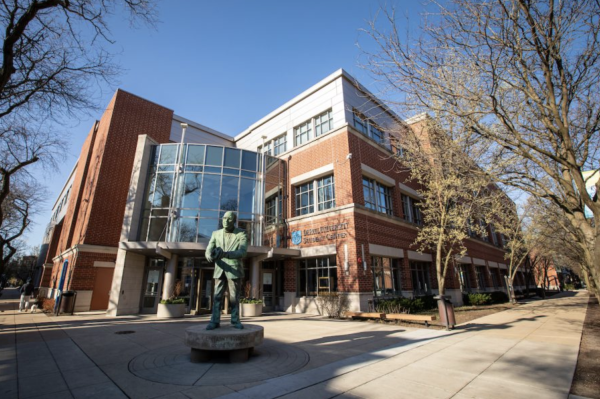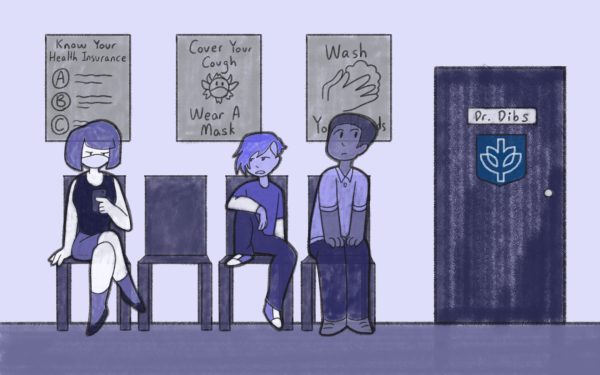Campus Housing adapts to new quarantine protocol for winter quarter
FILE PHOTO—Kassidy Kascht sits in her bunk doing homework in her converted housing unit in Clifton-Fullerton Hall. Kascht’s room was designed to house two students, but currently houses three freshmen.
To ring in the second quarter of the school year, DePaul’s Department of Housing opened its doors to another handful of students amid the coronavirus pandemic.
The Department of Housing extended the offer for students with an active housing agreement to return to campus under a few conditions.
According to the Department of Housing, all students returning to campus will live in a single room with a private bathroom. They must participate in a 14-day quarantine from the beginning of their move-in date — either Jan. 3 or 4 — until Jan. 17. In addition, those students must attend a required Covid-19 testing appointment within the two-week quarantine period.
Students in quarantine are permitted to leave their dorms to seek medical care or Covid-19 testing with the expectation that the individual will return to their residence immediately following treatment, according to the City of Chicago’s website.
“The success of these health and safety measures depends on the full cooperation of all students following the quarantine protocols,” said Rick Moreci, director of the Department of Housing and Student Centers. “If any students do not follow the protocols, there will be consequences for these actions. This is the only way we can ensure the health and safety for all of our students and our staff living and working on campus.”
In a follow-up email interview with Moreci, he said the consequences for breaking the quarantine will be determined on a case-by-case basis but in extreme situations, suspension from university housing is possible.
Living on campus is not the same as it once was, according to Moreci.
“Campus changed drastically starting last March and has remained changed since,” Moreci said. “Many campus buildings have remained shut down or have limited hours. Most meetings with faculty and staff are virtual to include most classes. Students living on campus all live in single rooms and several residence halls remained closed. Students get most of their meals from the Student Center to go. Interactions on campus overall are significantly different and significantly less.”
However, in a statement to The DePaulia, the Division of Student Affairs urged students to participate in virtual campus happenings and events by searching for opportunities through DeHub’s Digital Engagement Network.
“Now more than ever, it’s important for our students to find opportunities to connect with others,” said Director of Student Involvement Courtney James. “Throughout winter quarter, Student Involvement’s focus is on helping students to connect to combat loneliness and find a sense of belonging.”
With few in-person classes available and most DePaul events being held virtually, campus life looks different in the age of Covid-19.
But for DePaul sophomore Danielle Nolen, after seeing her mother, aunt and grandmother test positive for Covid-19 and getting the virus last summer, Nolen is just happy to be back on campus.
“My WiFi situation at home wasn’t the best at all,” Nolen said. “And I didn’t do too well in the last quarter of school, so I was like, ‘I need to be in the school mindset.’ So I feel like being on campus alone, away from my family will really get me there. Being back at school will encourage me to do better.”
While hot meals delivered and quiet study space sounds like any college student’s dream dorm experience, quarantine may not be easy for everyone.
Quarantining and self-isolating help stop the spread of Covid-19, but caring for mental wellbeing during the pandemic is just as important, according to the CDC.
Katie Bellamy, a substance misuse prevention specialist for DePaul’s Office of Health Promotion and Wellness, said practicing “self-care” and “self-compassion” during the quarantine is essential to take care of the “mind, body and spirit.”

The Department of Residential Education implemented a twice-a-day check-in system that every student is required to reply to via email within two hours. If Residential Education doesn’t hear back, the resident director on duty will email, then call the student to make sure they are safe. But in instances when a student doesn’t reply, then the resident director on duty will do a socially distanced in-person check in.
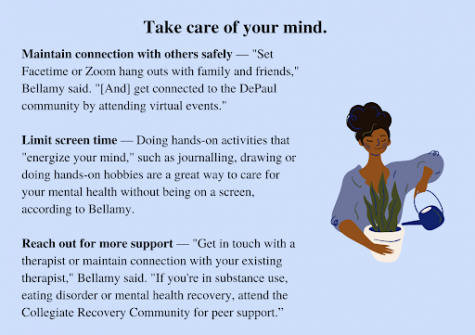
“Residential Education cares deeply about its students,” said Brent Ploughe, associate director of Residential Education. “We recognize that whenever a student enters a quarantine period, it can weigh heavily on them. The check-in system was developed as means to support students, ensure they are feeling well and provide access to any resources that may help them throughout the quarantine period.”
